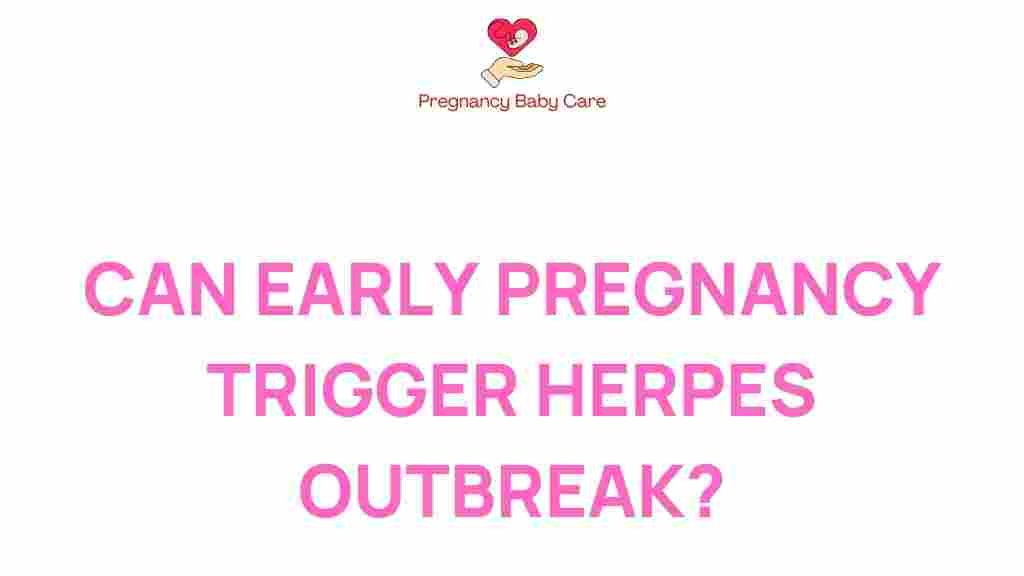Could Early Pregnancy Unleash Hidden Herpes Outbreaks?
Early pregnancy is a time filled with anticipation and excitement, but it can also bring about unexpected health challenges. One of these challenges may include the reactivation of dormant herpes virus, leading to herpes outbreaks. Understanding the connection between early pregnancy and herpes outbreaks is crucial for maintaining women’s health during this pivotal time.
Understanding Herpes: A Brief Overview
Herpes simplex virus (HSV) is a common virus that can cause outbreaks of sores and blisters, primarily affecting the mouth (HSV-1) or genitals (HSV-2). While many people are infected with the virus, not everyone experiences noticeable symptoms. The virus can remain dormant in the body for long periods, only to reactivate under certain conditions.
The Immune Response During Early Pregnancy
During early pregnancy, a woman’s body undergoes significant hormonal and physiological changes. These changes can impact the immune response, which is crucial for protecting both the mother and the developing fetus. The immune system often shifts to allow for the acceptance of the fetus, which can inadvertently lead to a weakened defense against infections, including herpes.
Viral Activation: How Early Pregnancy May Trigger Outbreaks
Several factors during early pregnancy can contribute to the activation of the herpes virus:
- Hormonal Changes: Increased levels of hormones such as progesterone can influence the immune response.
- Stress: The emotional and physical stress of pregnancy can weaken the immune system.
- Fatigue: Pregnancy often leads to fatigue, which can further compromise immune function.
- Changes in Health Habits: Morning sickness and dietary changes may affect overall health and immunity.
These factors can create an environment conducive to viral activation, potentially leading to herpes outbreaks during early pregnancy.
Health Implications of Herpes Outbreaks in Early Pregnancy
Herpes outbreaks during early pregnancy can pose several health implications for both the mother and the baby:
- Maternal Health Risks: Outbreaks can cause discomfort and stress for the mother, which may impact her overall health.
- Pregnancy Complications: In severe cases, herpes outbreaks may lead to complications such as preterm labor.
- Transmission Risks: If an outbreak occurs near the time of delivery, there is a risk of transmitting the virus to the baby during childbirth.
Recognizing Symptoms of Herpes Outbreaks
Being aware of the symptoms of herpes is essential for early intervention. Symptoms may include:
- Itching or burning sensations in the affected area
- Small red bumps or blisters
- Painful sores that may burst and crust over
- Flu-like symptoms, including fever and swollen lymph nodes
If you experience any of these symptoms during early pregnancy, it is crucial to consult with your healthcare provider.
Management and Prevention of Herpes Outbreaks
While herpes cannot be cured, there are effective management strategies to minimize outbreaks and their impact during early pregnancy:
- Consult Your Doctor: If you have a history of herpes, inform your healthcare provider as soon as you become pregnant.
- Antiviral Medication: Your doctor may prescribe antiviral medication to manage outbreaks and reduce the risk of transmission.
- Stress Management: Practice relaxation techniques such as yoga, meditation, or deep breathing exercises.
- Healthy Lifestyle Choices: Maintain a balanced diet, exercise regularly, and get adequate rest to support your immune system.
Troubleshooting Tips for Managing Herpes During Early Pregnancy
If you experience a herpes outbreak during early pregnancy, consider the following troubleshooting tips:
- Keep the Area Clean: Gently wash the affected area with mild soap and water to prevent infection.
- Avoid Irritants: Steer clear of harsh soaps, lotions, or any products that may irritate the skin.
- Wear Loose Clothing: Opt for breathable fabrics to reduce friction and irritation in the affected area.
- Stay Hydrated: Drink plenty of water to support your overall health and immune function.
Conclusion: Prioritizing Women’s Health During Early Pregnancy
Early pregnancy is a transformative time, but it is essential to remain vigilant about potential health challenges, such as herpes outbreaks. Understanding the relationship between early pregnancy, immune response, and viral activation can empower women to take proactive steps to manage their health. By consulting healthcare providers, utilizing antiviral treatments, and adopting healthy lifestyle choices, pregnant women can reduce the likelihood of herpes outbreaks and ensure a healthier pregnancy experience.
For more information on women’s health during pregnancy, visit this resource.
For further reading on herpes management, check out this external link.
This article is in the category Pregnancy and created by PregnancyBabyCare Team
